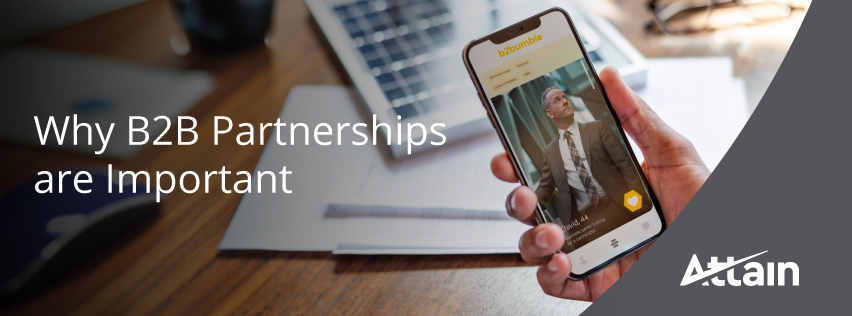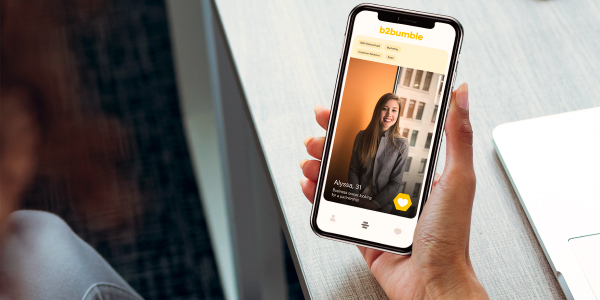Why B2B Partnerships are Important

The number one easiest sale is to an existing customer.
The second is to a referral.
And one of the best ways to maintain a consistent flow of referrals is through a B2B partnership.
A B2B partnership is when two or more companies work together to achieve a win-win relationship that benefits everyone involved. This can involve collaborating on service development, marketing, or exploring new business opportunities to help each other grow and create more value together.
In B2B partnerships, unlike B2C transactions, the financial stakes are usually higher. Therefore, it is crucial to carefully consider who your ideal partner is, how that relationship should be maintained, and understand what you should be prioritising (hint: it isn’t money).
Table of Contents

The power of B2B partnerships
Having a B2B partnership means having an open door between you and a partner, where referrals can easily be ushered through – a far more cost and time-efficient method compared to chasing down leads.
Aside from being a more straightforward approach to closing deals, it also falls under one of the most fundamental aspects of business and even in life – two is always better than one.
Having the right people by your side, supporting each other with new business and actively collaborating is undoubtedly one of the best ways to thrive and get ahead of competitors.

Finding a B2B partner
Unfortunately, there’s no dating like-app for finding the right B2B partnership (what would that be called? B2Bumble?)
However, there are things to look out for in identifying an ideal partnership.
- Industry experts: Aligning yourself with a business that is a leader and an expert in their market can reflect on your own brand’s reputation as a leader.
- Find common ground: Any lasting relationship is founded on shared values; the same goes for business. If you can identify overlap between your business’ values, chances are you’re on your way to having a sustainable and balanced partnership.
- Identify their target customer: You must also ensure that you’re considering their needs. Are your customers actually suited for them? Or are you making promises that might be outside of your wheelhouse?
- Go with your gut: Sometimes we wish things came in a nice packaged framework, but ultimately the final decision will come down to your gut instinct. If you find you’re constantly second-guessing this pairing, chances are there’s a reason for that.
The do’s and don’t’s
There isn’t necessarily B2B partnership etiquette, but sometimes businesses go in with the wrong expectations, which can cause the relationship to crumble.
Here are a few things to keep in mind:
- Do give them referrals because it’s the best thing for the client. That’s ultimately what’s going to make this all work – you’ve aligned yourself with a business that is genuinely good at what they do and can actually add value to your customers, which will then enhance the retention of that customer.
- Don’t keep score. The ‘I gave them a referral last week, so now they owe me one’ isn’t a healthy approach to take, and it eventually results in both sides throwing pointless referrals at each other just for the sake of doing it.
- Don’t give 50%. Give 100%. If both sides only give it half, then that’s all you’re going to get in return. If everyone gives it their all, then everyone gets more.
- Do empower each other. At the end of the day, this is a relationship, and it’s going to need more than just dollars to survive. Ensure you’re consistently engaging, giving feedback, and recognising each other’s wins.

Prioritise authenticity
Your B2B partnership should be the real deal, which means there needs to be a high level of trust and autenticity and that should always come before commission.
Just as well, authenticity goes beyond short-term gains and emphasises long-term customer success.
B2B partnerships should be measured by a brand’s commitment to meeting customer needs rather than just focusing on cost reduction or superficial marketing gains. The customer experience should always be at the forefront of any B2B relationship.

Scaling Up
Attain recently established a partnership with Adrian Pickstock, a B2B partnerships strategy and consultant coach with over 20 years of experience leading businesses through significant growth and change periods.
Pickstock’s expertise in driving medium to large corporations through the challenges of growth and his recognition of the opportunity to improve value-add to businesses aligns with our focus on delivering results.
Together, we developed a round table programme based on Verne Harnish’s ‘Scaling Up’ methodology. Pickstock, a certified Scaling Up expert, facilitates these round table discussions and helps businesses successfully target these key areas for growth. Our partnership also provides an opportunity for peer-to-peer learning and valuable discussions among participants at various stages of their growth journey.
To date, we’ve been able to collaborate and enhance our individual missions and create new opportunities for us both to grow.
Conclusion
B2B partnerships are a powerful tool for businesses to leverage existing customer relationships and drive referrals.
By collaborating with like-minded partners, businesses can create win-win relationships that benefit everyone involved. It’s important to carefully consider and select the right B2B partners based on industry expertise, shared values, and target customer alignment. Building trust, prioritising customer-centricity, and fostering authenticity should be at the forefront of any B2B partnership.
